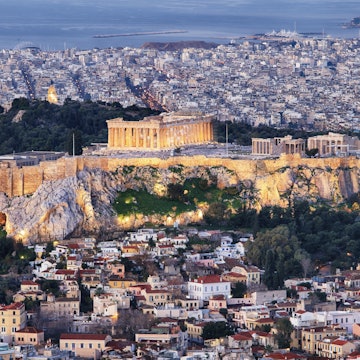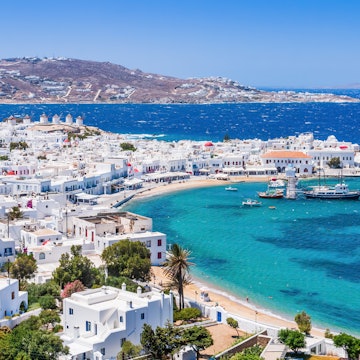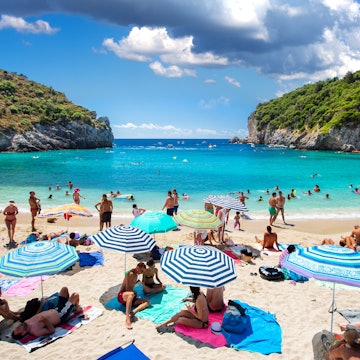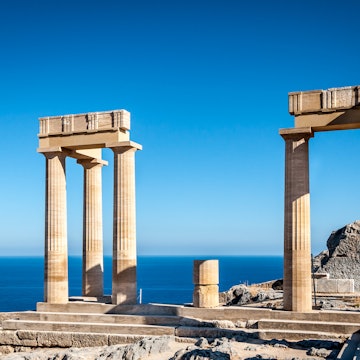

The Acropolis, Athens. Marco Argüello for Lonely Planet
In 2003, Greece was feverishly preparing a homecoming for the Olympics. Despite countless news headlines claiming Athens wouldn’t be ready in time, the 2004 Games were staged successfully, more than a century after the Greek capital hosted the first modern Games in 1896.
But if you ran a Google search for "Athens" at the time, the results would surprise you. Page after page listed links to information on Athens, Georgia. Sure, the southern US city, incorporated in 1806, was named in honor of the intellectual thought and higher learning that thrived in classical Greece.
But, for Greece, it was a little embarrassing that anyone interested in visiting the original Athens would have to dig deep to find information about the city best known for evolving democracy, philosophy, science, mathematics, drama and literature, art, along with many other elements of global culture. Athens’ diminutive size in the 5th and 4th centuries BCE belied the city-state’s Golden Age achievements, including its most recognizable landmark, the marble-built 5th-century BCE Parthenon sitting on high atop the Acropolis.
Today, the sheer volume of information on Athens online can be overwhelming, even for the most experienced globetrotters. There are ancient sites to explore, treasure-filled museums, a lively dining and nightlife scene, buzzing neighborhoods and a beach-studded coastline.

Athens transformed by tourism
From Greece’s decade-long economic crisis that lasted till around 2018 emerged a city battered and bruised. But it was brimming with creativity, an irresistible energy and boundless hope for the future. Artists and other creative types poured in, taking advantage of cheap rent and a cost of living considerably lower than its Western European counterparts.
Even in hard times, Greeks exercise a spontaneity not seen elsewhere in the Old Continent. During the crisis, many Athenians didn’t – and still don’t – have cash to splash. But they were determined to live by the post-war Greek movie I Ftohia theli Kaloperasi (1958), which translates as “in poverty, good times are necessary”. For that reason, wine bars mushroomed in the city’s backstreets, where people could get together for a drink and a bite to eat, without blowing their budget. Socializing over food is inherent to the Greek psyche.
The city began swiftly transforming into an exciting, welcoming metropolis. Smart new hotels, restaurants and cafes opened, bringing life and color back to drab streets and squares that had lost their soul when businesses shuttered.
Then the pandemic brought everything to a standstill, as it did everywhere. When Greece reopened, the city’s tourism fortunes recovered relatively quickly. However, this led to some negative consequences. Foreign investors had flocked to the capital during the crisis to snap up property at low prices and have been quick to convert entire buildings into short-term rentals. The rise of platforms like Airbnb has made it harder for Athenians to secure affordable housing. Some believe that, with locals priced out of the market, certain smaller neighborhoods are losing their character.

What visitors can expect now
In 2025, Athens is expected to receive a record 10 million visitors, almost equal to the country’s population. That’s an increase of around two million compared to the previous year. Athens Mayor Haris Doukas welcomes Athens’ growing popularity. More visitors are spending three or four days exploring the city rather than hotfooting it to the islands, as happened in previous years. For European vacationers in particular, Athens is an easy-to-reach city break.
However, this relatively sudden increase in foot traffic is proving somewhat problematic for locals who live in the city’s historic center as well as its aged infrastructure. In ancient Plaka, which has been continuously inhabited since the Neolithic period, the number of residents might be diminishing, but they’re not giving up without a fight. Doukas has spearheaded a task force to safeguard the old town – studded with terracotta-roofed, listed neoclassical mansions – from being overrun by tourism. Plaka forms part of the geographical area of the Acropolis’ UNESCO World Heritage site and is governed by strict residential rules, including the existence of hotels in specific areas. Developers, however, have taken advantage of a legal loophole by advertising short-term rentals as serviced apartments. Plaka and the adjacent Monastiraki neighborhood, known for its flea markets and lively rooftop bars, swarm with visitors, particularly between April and October. Restaurants, cafes and shops do a roaring trade.
In February 2025, Doukas told the Guardian: “For the first time we’ll be Greece’s top destination, but it’s unsustainable. Plaka, in particular, is oversaturated. It can’t go on.”

What locals have to say
Tina Kyriakis is the owner-operator of walking tour company Alternative Athens. She believes Athens has experienced a much-needed revival, particularly in her neighborhood of Psyrri, adjacent to Monastiraki. “Today, Psyrri is one of the most vibrant places in the city. It’s full of Airbnbs, cafes, bars, little shops, and restaurants. There isn’t a single corner left unused,” Kyriakis says.
In 2023, long lines of visitors languished in the summer heat for hours, waiting to enter the Acropolis. Now, people need to book a ticket that permits timed entry of no more than an hour. Kyriakis feels the Greek culture ministry’s response to managing this "solved all the problems for visitors, companies and guides…It works like clockwork,” says Kyriakis.
Still, she has some concerns. “Athens is a city that derives its charm from standalone houses, little workshops, old cafes, small restaurants, artisan stores. Some shops date back 100 years,” Kyriakis says. “What troubles me about Athens is to what degree all the tourism development will alter the character of the city.”
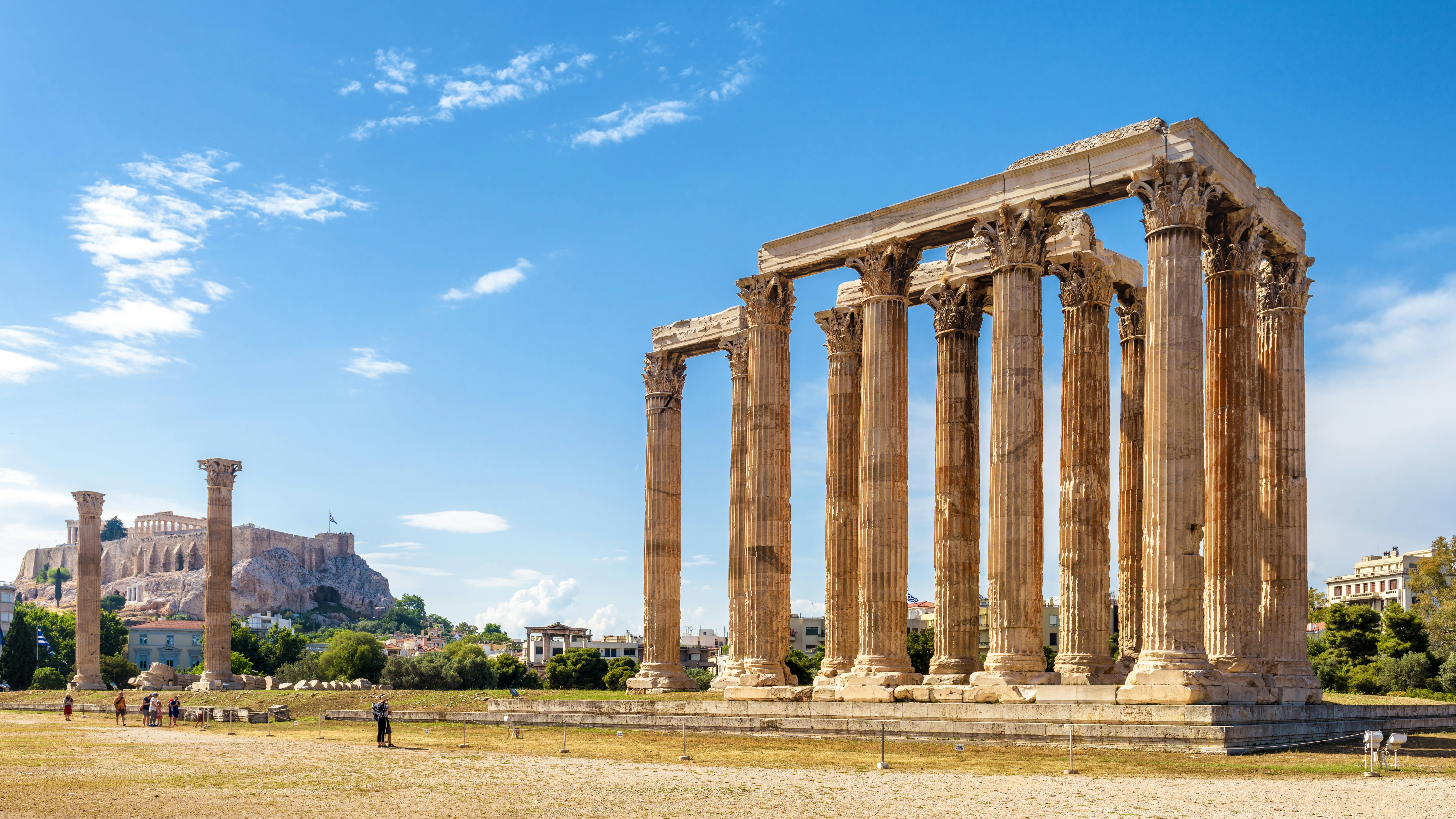
Tips on visiting Athens, in peak season and beyond
If you’re in Athens between May and October, aim to visit the Acropolis in the afternoon, after 5pm or 6pm, says Kyriakis. “Fewer people are there, even during peak months, and you can see the Parthenon during sunset, which is beautiful,” she says. If you can bear the summer heat, August is a good month to visit Athens, as most locals and visitors escape to the islands.
For those who can avoid the busy months of June and July, try scheduling your Athens trip for April, May, September or October. In winter, the city is glorious. “Athens is the city with the highest degree of sunshine and the least amount of rainfall in Europe. Few people know that,” says Kyriakis.
While you might chance upon some cloudy weather or rain between January and March, the temperatures remain mild. Mingling with locals is guaranteed at this time of year, too. With less pressure on hospitality workers in the off-peak period, service is better, it’s easier to book a table at restaurants, and there are fewer visitors at the ancient sites. Hotel accommodations and car rental rates drop, and there are offers on guided tours, too.
Neighborhoods to check out, beyond the obvious
Beyond the well-known locales of Plaka and Monastiraki, there are plenty of neighborhoods buzzing with life. Head to Pangrati for a dose of cafe culture and cocktails at the Rabbit Punch and Michelin-starred flower-lavished farm-to-fork fare at Soil. Foodies shouldn’t miss otherwise unassuming Neos Kosmos, where hip restaurants serving neo-Hellenic cuisine have sprouted in recent years, among them Fita and Epta Martyres.
Among Kyriakis’ favorite neighborhoods is Mets, above the pillars of the Temple of Olympian Zeus. “There are many neoclassical houses and pedestrianized streets. It exudes a calm confidence. The First Cemetery is a magical place,” she says. “There is a good amount of hipster cafes, flower shops, patisseries and restaurants.”

Choose locally owned hotels and dive into the arts scene
Katia Tsimidopoulos, a hotelier for three decades, lived in the city center for 10 years. As the co-owner and CEO of HP Hotels, she gets to spend most of her day at the four-star Herodion Hotel in the Acropolis neighborhood. The hotel is situated less than a quarter mile from the Acropolis and 100m (328ft) from the Acropolis Museum. In 2026, family-owned Herodion celebrates its 50th year.
Situated in a locale known as Gargaretta, named after a 19th-century Italian family, pastel-hued neoclassical mansions stand proud. Residents include generations of families, who continue to shop at the local grocery store that has been around for 49 years, or the three-decade-old bakery.
Tsimidopoulos says the Greek capital offers hotels for all budgets and at rates lower than most other European cities. “Athens is lively. You can walk the streets, choose a restaurant to dine or have a drink at one of the countless bars. Here, we go out, regardless of age,” she says. In winter, seek out cozy jazz bars, rock bars and hidden rembetika, where you can listen to Greek-style blues.
Meanwhile, Athens’ arts and culture scene is rich and varied. “We have wonderful museums like the Museum of Cycladic Art and the Benaki Museum, which actually comprises seven museums. There’s the Ilias Lalaounis Jewelry Museum and the contemporary art cultural space Onassis Stegi. All of them are concentrated in the city center,” Tsimidopoulos says. “Many people don’t realize because they stay for one or two nights and only visit the Acropolis and its museum.”
When summer rolls around, Athenians carefully peruse the events calendar for the annual Athens Epidaurus Festival, which has been going strong since 1955, hosting renowned global names and emerging artists.

Move around on foot or with public transport
Don’t bother renting a car in Athens; there’s no point. The city is very walkable and also has an excellent and affordable public transportation system. The Athens Metro is the quickest way to move around town, while there are also buses, trolley buses and a tram. You don’t even need a ticket to ride the latter three. Swipe your debit or credit card or your phone across the validators on board the vehicles to pay directly. Taxis are plentiful, with one of the main cab ranks located on Syntagma Sq, and less expensive than in other European cities. Use smartphone apps like FreeNow or Uber (which operates with regular taxis) to book a cab in advance. Privately-operated hop-on, hop-off buses can take you further afield, with routes reaching Piraeus and the coastal suburbs of Vouliagmeni.
Dodge the heat and go south
When the temperatures ramp up in the city, follow the locals south. The Athens Riviera stretches some 61km (38 miles) from Piraeus to Cape Sounion at the southeastern tip of greater Athens. This long strip of coastline is bursting with Blue Flag beaches, waterfront cafes, restaurants and bars, and chi-chi resort suburbs like boutique store-filled Glyfada. Spend half a day winding down at Lake Vouliagmeni, easing bodily aches and pains in mineral-rich waters. Wrap up your Athens stay with a sunset visit to the 5th-century Temple of Poseidon in Sounion, where Lord Byron mischievously etched his name into one of the marble pillars (don't attempt to do the same).










